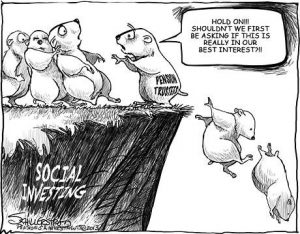
Suppose you are an investor just entering the market, eagerly looking for a firm that has the potential for high returns and is worth investing. How would you investigate? In which aspects?
While the topic of “business ethics” was still lingering around my head, a term called “ESG Investing” popped up on the computer screen in front of my eyes. The three components of “ESG” — “Environmental”, “social”, and “governance” have become a trendy approach for the investors to learn about the firms. Despite of the fact that the first funds related to sustainability started around 1970s, the amount of assets invested with a consideration on ESG have increased $8 trillion globally in recent years. In addition to the data collected online, it has been proven that the returns are much higher than the expectations, as the ethical behaviors of industries almost turn into a household concern. As a result, nowadays, when deciding whether to invest or not, instead of looking at a company’s financial performance, the investors are more willing to take its contribution on the society into consideration.
However, the standard of ethics is subjective that it varies from person to person. Jack Richards, an investment analyst at Capita Employee Benefits argued in one of his articles that some industries, such as tobacco, alcohol, and arms, are not distracting social welfare if they don’t promote or encourage excessive consumption. The boundaries are not clearly defined. Some companies then take the benefits of those grey areas in between, claiming that they are “ethical” enough to be invested without any factual evidence. Those who build their businesses step by step yet don’t contribute much for the “social good” are automatically out of this game.

Being attracted by the reputation and advantages from “ESG Investing”, many of the investors gradually lose their original intentions in the market. More importantly, instead of getting what the firms should have deserved for themselves, the economy, and global market, the direction of the overall approach is now being misled by something else.
If you are the investor, would you let “ESG” dominate your decisions?
References:
Ethical investment is booming. But what is it? (2017, September 21). Retrieved September 27, 2017, from https://www.economist.com/news/finance-and-economics/21729463-esg-investment-hard-define-and-its-returns-are-hard-measure-ethical
Schillerstrom, R., Matthew Wurtzel (2013, January 22). Poll result: Should public pension plans use ESG screens when investing? Retrieved September 27, 2017, from http://www.pionline.com/article/20130122/ONLINE/130129982/poll-result-should-public-pension-plans-use-esg-screens-when-investing
Anon, (2017). [online] Available at: https://www.linkedin.com/pulse/esg-investing-rising-tide-jack-richards [Accessed 27 Sep. 2017].

